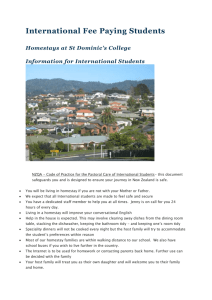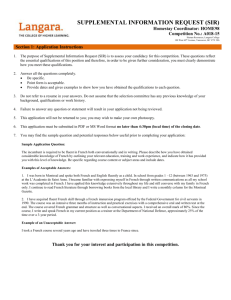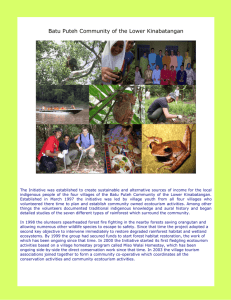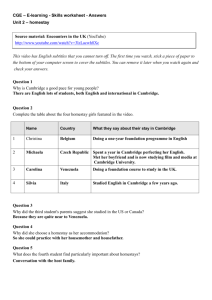Community Based Tourism as a Tool for Rural Development: TO
advertisement
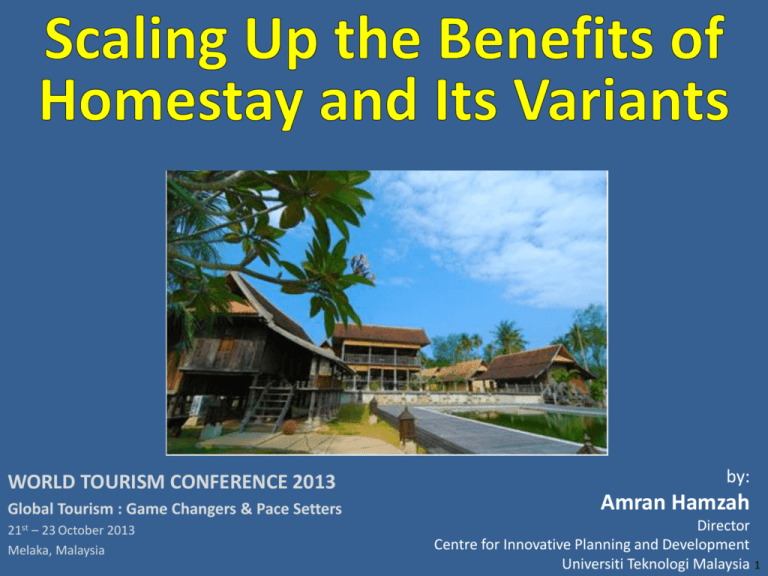
WORLD TOURISM CONFERENCE 2013 Global Tourism : Game Changers & Pace Setters 21st – 23 October 2013 Melaka, Malaysia by: Amran Hamzah Director Centre for Innovative Planning and Development Universiti Teknologi Malaysia 1 I PROMISE TO BE AS BRIEF AS POSSIBLE NO MATTER HOW LONG IT TAKES 2 2 CONTENTS • Definitions of homestay • Homestay as part of Community Based Tourism (CBT) • CBT performance – a reality check • Scaling up the homestay experience • Conclusions 3 3 DEFINITIONS OF HOMESTAY Phillipines Homestay is a living arrangement with a host family or organization who offers extra private room or space for an out of town guest for a reasonable charge compared to other accommodation providers. A hosting family or group offers the guests a home away from home. Source: Department of Tourism, Philippines Thailand Cambodia A “homestay” or home stay is exactly what it sounds like, staying within the home of a Thai family. Such experiences are intended to provide cultural immersion in Thai village lifestyles, allowing visitors to see how real Thai families live. A homestay means exactly like staying with the home of a Khmer family. Khmer Home Stay is a unique experience for those travellers interested a more meaningful and a closer look into Khmer rural life. Such experiences are intended to provide cultural immersion in Khmer village lifestyles, allowing visitors to see how real Khmer families live. Source: Tourism Authority of Thailand Source: Tourism of Cambodia 4 DEFINITION OF HOMESTAY (cont.) Malaysia Homestay Definition by MOCAT (1995) (now MOTAC) “….. where tourists stay with the host’s family and experience the everyday way of life of the family in both a direct and indirect manner”. Applies to houses offering not more than 3 rooms 5 WHAT IS THE HOMESTAY EXPERIENCE? • Is it confined to experiencing authentic rural life through an experiential interaction with the host family (in his home)? OR • Does it include participating in activities related to ecotourism, adventure tourism, cultural tourism, agritourism etc.? 6 Source: Hasim, KOPEL HOMESTAY AS A BASE (FACILITY) OR AN ATTRACTION? Source: Hasim, KOPEL Source: Hasim, KOPEL Initially to provide accommodation for tourists to visit surrounding ecotourism attractions Has evolved into a unique tourist experience and as a tool for rural development and empowerment 7 HOMESTAY IS A SUBSET OF CBT. COMMUNITY BASED TOURISM (CBT) Homestay & its variants 8 WHY IS CBT POPULAR? 1. Inherent potential as a tool for rural development and empowerment 2. Pro poor thus populist nature 3. Low start up capital 4. Convenient vehicle for political mileage 9 MAIN BENEFITS OF CBT 1 9 Creation of direct jobs for the local community Protection of local resources (e.g., preservation of the environment as a tourist attraction) 2 Additional income for the local community 3 Education and further training opportunities (language, service, restaurant, guiding etc.) 8 7 Preservation of the cultural heritage or strengthening of the cultural identity Improvement in the standards of living 4 Strengthening of social or organisational structurewithin a community 6 Reduction of migration, particularly for teenagers 5 Empowering women and youths 10 CBT Networks ASIA The Thailand Community Based Tourism Institute (CBT-i) Community Based Tourism Network Korat, Thailand Homestay Thailand Cambodia Community-Based Ecotourism Network (CCBEN) Mongolian Community Based Tourism Network (CBTN) Bali JED Village Ecotourism Network Vietnam Community Based Tourism Network Indonesia Ecotourism Centre (INDECON) Kyrgyz Community Based Tourism Association 11 More CBT Networks AFRICA Namibia Community Based Tourism Assistance (NACOBTA) Uganda Community Tourism Association (UCOTA) Ghana Community Base Ecotourism – Nature Conservation Research Centre (NCRC) Swaziland Shewula CBT Camp Community Based Tourism Africa Directory Tea farmers Association of Rungwe CBT Project (Tanzania) 12 Other CBT Networks CARRIBEAN Jamaica Community Tourism Countrystyle Community Institute for Sustainable Tourism 13 More Of The Same LATIN AMERICA Costa Rican Community Based Tourism Association (ACTUAR) Costa Rica Rural Community Tourism – COOPRENA Tours Honduras – La RutaMoskitia Ecuador – El Proyecto el Condor Ecuador – Runatupari (UNORCAC) Local Communities Insertion Network for Latin America 14 Malaysia’s Homestay Performance 2012 attracted 325,258 tourists 20.4% international generated RM18.55mil income 17.9% Increase compared to 2011 Source : The Star, 15th August 2013 15 Malaysia’s Homestay Programme Won UNWTO 2012 Ulysses Award For Innovation in Public Policy and Governance 16 CRITICAL FINDINGS BY ICRT STUDY Goodwin (2009) surveyed 750 experts (funders, conservationists and development workers) : 134 replied nominating 116 CBT initiatives 28 responded Only 4 found to be economically sustainable 17 REASONS WHY? 190 out of 218 CBT projects in Africa (20082009) failed within 3 years Dependency syndrome Lack of adequate markets Lack of local capacity Low bed occupancy (5%) Poor leadership and organisation 18 THE NEED TO SCALE UP HOMESTAY Through increasing the breadth and depth of the homestay experience To increase arrivals and yield To be integrated with mainstream tourism industry Source: Hasim, KOPEL Source: Hasim, KOPEL 19 INCREASING BREADTH OF HOMESTAY EXPERIENCE - Creating Homestay Variants Privacy Intimacy Authentic Rural Experience Market Segment ‘LIVE IN’ HOMESTAY LOW TO MEDIUM HIGH HIGH Students FITs Voluntourists ANNEXED TYPE HOMESTAY HIGH MEDIUM LOW to MEDIUM FITs Small Families LOW to MEDIUM VILLAGESTAY HIGH LOW Students FITs Voluntourists Small Families Groups 20 Example 1: Village (kampungstay) as driver to move up surrounding areas along value chain 21 Example 2: Mainstreaming of CBT 22 THE ‘RIGHT’ HOMESTAY MIX? Miso Walai Homestay Sabah, Malaysia Received 2,772 tourists in 2011 7,179 guest nights ‘Lost’ 1,700 guest nights because guests had no choice but stay with 34 homestay operators Solution?... Source: Hasim, KOPEL Source: Hasim, KOPEL 23 PROVIDE MORE OPTIONS FOR GUEST ACCOMMODATION + ‘Live in’ Homestay + Ecolodge TREC + Hammock Camps 21st Dormitory RREC Villagestay Century Village 2,981 tourist arrivals in 2012 7,404 guest nights in 2012 average length of stay (ALOS) increased from 2 nights in 2011 to 2.5 nights in 2012 26% increase in income 24 INCREASING THE DEPTH OF THE HOMESTAY EXPERIENCE A B Enhancing Interpretation and Story Telling E C Improving Bonding through Food Creating a Career Path Establishing and Strengthening Partnership Reducing Environmental Tokenism G F Adding Fun to Educational Experience D H Avoiding the ‘Dependency Trap’ Strengthening Leadership And Local Organisation 25 A. ENHANCING INTERPRETATION AND STORY TELLING Intermediate and advanced training modules Pedagogy vs. Andragogy Increase variety of trails Certification of local guides Miso Walai Homestay From river cruise to archeological trails 26 PEDAGOGY VS ANDRAGOGY Source: Hasim, KOPEL Source: Hasim, KOPEL Most CBT operators are adults with limited formal education Mismatch in training programmes Too focused on pedagogy (classroom teaching) Andragogy (adult learning)more appropriate for homestay operators Role playing, technical visits, hands on learning, role playing, community to community training 27 …OR BACK TO BASICS “Smile when they arrive” “Cry as they leave” (President, Malaysian Homestay Association) 28 B. IMPROVING BONDING THROUGH FOOD Japanese students expect: Go to the market/ farm with host family to buy/ gather ingredients Involved in food preparation Eat with family members HIGHLY INTERACTIVE Learn to cook at least 1 local dish Cook same dish for own family once back 29 For Villagestay: BRINGING THE ‘BACK REGION’ TO THE FRONT Food safety assurance Ambience and hygience Presentation Prompt and friendly service 30 C. REDUCING ENVIRONMENTAL TOKENISM Homestay programmes often include environmental conservation Tree planting always carried out before departure A novelty until every homestay does it ‘Feel Good’ factor but guests seldom get to see ‘plant cemetery’ Should incorporate systematic reforestation or reef restoration etc. 31 SYSTEMATIC FOREST RESTORATION INSTEAD OF ENVIRONMENTAL TOKENISM 32 Source: Hasim, KOPEL32 BEYOND ENVIRONMENTAL TOKENISM Before (2008) BACK After (2010) Source: Hasim KOPEL 33 33 Kinabatangan Corridor of Life 34 34 D. ESTABLISHING AND STRENGHTENING PARTNERSHIPS Tourism Industry Government Agencies Partnership Universities NGOs Should start at the beginning CBT projects have to be weaned of their over reliance on government/ NGOs and forge dynamic partnership with the industry 35 DEVELOPING PARTNERSHIPS TO OPEN UP NEW MARKETS Partnership With Tourism Industry Widens Market Need to form partnerships with tour operators with international networking and voluntourism companies 36 E. ADDING FUN TO EDUCATIONAL EXPERIENCE …from mock weddings …to paragliding Generates extra and substantial income 37 F. CREATING A CAREER PATH Kauahi Ngapora– From Tour Guide to CEO of Whale Watch • Economic benefits important in short term but having career path crucial in long term • Kaikoura Whale Watch sponsors training of guides to be promoted to captains • At Miso Walai Homestay senior guides aspire to become become travel consultants or rural entrepreneurs 38 G. AVOIDING THE ‘DEPENDENCY TRAP’ Lack of Local Capacity ‘Hand Holding’ by Government / Donors Over Dependence on Financial and Technical Aid 39 ‘DIFFICULT BIRTH’ CBT projects usually located in remote areas, involving marginalised and even impoverished communities Lack of local capacity a major handicap ‘Hand holding’ at infancy may lead to ‘dependency trap’ UNDP recommends a gestation period of 5 years 40 Patient Courageous Good Communicator Visionary H. STRENGTHENING LEADERSHIP AND LOCAL ORGANISATION Proactive Trustworthy Sensible Innovative Disciplined Resourceful I am a Local Champion Essential role of local champion during formative years But local champion may become local elite 41 Gradual Transformation To Systematic and Broader Based Organisation SOCIAL ENTERPRISE (Tourism Cooperative KOPEL) Broader Based Organisation (ASSOCIATION) 8 years 3 years LOCAL CHAMPION Inception MISO WALAI’S EXPERIENCE …………… 42 CONCLUSIONS Homestays are easy to set up but difficult to sustain Scaling up the homestay experience is vital to ensure economic viability The ultimate challenge is to transform homestay into a component of mainstream tourism 43
